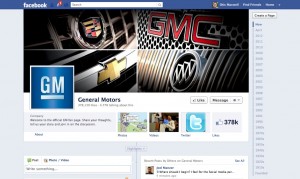
So General Motors has pulled its Facebook advertising because it determined its ads had little effect on consumer behavior, according to the Wall Street Journal. Marketing VP Joel Ewanik says the company “is definitely reassessing our advertising on Facebook, although the content is effective and important.” And by “content” he means the pages GM isn’t paying for, as opposed to the sidebar ads.
The story goes on to say that GM had a $40 million Facebook budget, only $10 million of which actually went for ads. The rest “covers content created for the site, agencies that manage the content and daily maintenance of GM’s pages, people familiar with the figures said.”
I took a look at what we can assume is the flagship page for the company, http://www.facebook.com/generalmotors. You can see it pictured here, but you should go check it out for yourself. Then go check out a few other pages, like Chevrolet (NOT “Chevy”) , Camaro, Chevrolet Volt and Corvette. Notice anything interesting? Yeah, the layout and content design is all the same. The whole thing is probably auto-filled by a content management system. If this is worth $30 million I want that gig!
Now notice what GM is doing to promote itself: promote ITSELF. There’s news of what this brand or that brand is doing, Guy Fieri driving a Corvette at the Indy 500 (let’s hope it doesn’t get stolen like his last car) and some proud customers pulling up to a plant in their car on a road trip. Yes, there’s a blurb at the top, “Welcome to the official GM fan page [sic]. Share your thoughts, tell us your story and join in on the discussion.” But nobody’s actually doing that. How about inviting readers to interact with you by sending in photos of their cars, telling stories about their first car, and maybe giving them a chance to WIN something?
And, almost none of these pages has any sidebar advertising. I’m guessing that Facebook pulled all the ads in a fit of pique, to make the pages even less interesting than they are. But here’s an idea: now that you’re spending 75% of your budget to build a “web presence”, is it worth the other 25% to give people a call to action and maybe buy something?
Probably not, if everybody is like GM executives and other WSJ reader: in a poll accompanying the article, 93.4% said they “rarely or never” are affected by Facebook advertising. What more proof could you want that this whole Facebook thing is a flash in the pan?